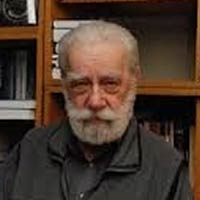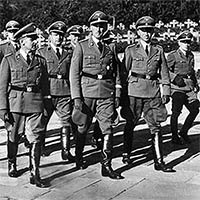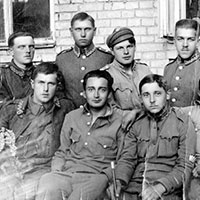Maurycy Diamant
Maurycy Diamant became known as early as 1936, before World War II, from the "orange scandal", where, together with others, he forged invoices from foreign companies and forged customs declarations, thanks to which the group to which he belonged obtained unlawfully discounts on customs. Diamant was then sentenced to a fine of 319,000 zlotys, with a change, in the event of irrecoverability, for 2 years detention, and moreover, 2 years of imprisonment, suspended for 5 years.
Marek J. ChodakiewiczMarek Jan Chodakiewicz (born 1962 in Warsaw) - Polish American historian, professor at The Institute of World Politics in Washington, specializing in the study of Polish-Jewish relations, the Shoah, and the history of Central and Eastern Europe in the 19th and 20th centuries. in his book "Lonek Skosowski: The End of Jewish Gestapo Collaborators" (polish "Lonek Skosowski: Koniec żydowskich kolaborantów Gestapo"), reported that during II World War, Maurycy Diamant, together with Julian Appel, managed a group of around 30 Jewish agents working for the Gestapo in Krakow.
In different sources from II World War, he appears also as Józef Diamand or Marian Diamand. Stanisław Dąbrowa-Kostka Stanisław Dąbrowa-Kostka (1924-2019) - lieutenant of the Home Army, lieutenant colonel of the Polish Army. During the Second World War, he was active in the Podkarpacie region. Awarded many times, author of books, studies and articles. Involved in scouting activities. He actively participated in the work of the Commission for the Investigation of Nazi Crimes. in his book "In Occupied Krakow" (polish: "W okupowanym Krakowie") wrote about him:
Stanisław Dąbrowa-Kostka (1924-2019) - lieutenant of the Home Army, lieutenant colonel of the Polish Army. During the Second World War, he was active in the Podkarpacie region. Awarded many times, author of books, studies and articles. Involved in scouting activities. He actively participated in the work of the Commission for the Investigation of Nazi Crimes. in his book "In Occupied Krakow" (polish: "W okupowanym Krakowie") wrote about him:
He had apparently been highly rated by the Gestapo. He was carrying firearms, and some members of his network were armed as well. He was assigned a trained dog. He operated in a climate of absolute impunity. Generally, he operated in Krakow, but the underground intelligence discovered his traces in the vicinity of Przeworsk, where he was directing some police action, in Jordanów, where (...) deceiving Jews with the hope of transferring them abroad, he robbed their property and murdered them. In Krakow, Diamand had a number of semi-open or well-hidden hiding places. The main base of the gang was the former underground premises in the outbuilding at 6 Sławkowska Street (...) Diamanda network was connected, among others, with Roman Słania's gang.
It was the most dangerous network of Gestapo (german: Geheime Staatspolizei) The Secret State Police established in the Third Reich, which ruthlessly fought against all forms of resistance in the occupied territories. Identified with the most terrible German crimes against Poles, and after 1942 also against Jews. Disbanded with the fall of the Third Reich in 1945. Recognized as a criminal organization by the International Military Tribunal in Nuremberg. agents in Krakow. Its members often impersonated the Polish underground, and reported not only Jews in hiding, but also Poles. They managed to cause so much damage that from the summer of 1943 to the spring of 1944, Krakow's Kedyw
(german: Geheime Staatspolizei) The Secret State Police established in the Third Reich, which ruthlessly fought against all forms of resistance in the occupied territories. Identified with the most terrible German crimes against Poles, and after 1942 also against Jews. Disbanded with the fall of the Third Reich in 1945. Recognized as a criminal organization by the International Military Tribunal in Nuremberg. agents in Krakow. Its members often impersonated the Polish underground, and reported not only Jews in hiding, but also Poles. They managed to cause so much damage that from the summer of 1943 to the spring of 1944, Krakow's Kedyw began the liquidation of its members and shot a dozen or so. But Diamand always escaped the Home Army
began the liquidation of its members and shot a dozen or so. But Diamand always escaped the Home Army Home Army (AK, polish: Armia Krajowa) – the clandestine armed forces of the Polish Underground State during World War II. traps. Ultimately, however, he was shot by the Germans in the Montelupich prisonMontelupich Prison - a former prison in Krakow. During World War II, there was a Nazi police prison under the Gestapo. In 1940–1944, about 50,000 people were imprisoned here. Mass executions of prisoners took place on the premises of the prison. Most of those arrested, after heavy interrogations, were transported to the concentration camps in Auschwitz-Birkenau and Płaszów. After 1945, the building housed a heavy central penal and investigative prison of the Security Office and the NKVD, through which several thousand Polish soldiers passed through, some of whom were deported deep into the USSR..
Home Army (AK, polish: Armia Krajowa) – the clandestine armed forces of the Polish Underground State during World War II. traps. Ultimately, however, he was shot by the Germans in the Montelupich prisonMontelupich Prison - a former prison in Krakow. During World War II, there was a Nazi police prison under the Gestapo. In 1940–1944, about 50,000 people were imprisoned here. Mass executions of prisoners took place on the premises of the prison. Most of those arrested, after heavy interrogations, were transported to the concentration camps in Auschwitz-Birkenau and Płaszów. After 1945, the building housed a heavy central penal and investigative prison of the Security Office and the NKVD, through which several thousand Polish soldiers passed through, some of whom were deported deep into the USSR..